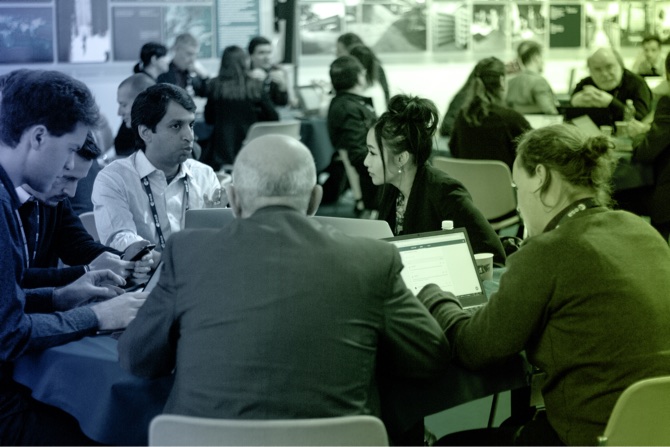“AI made in Europe” – boost it or lose it
.

.
When the term “artificial intelligence” (AI) was coined, more than 60 years ago, the vision of intelligent machines was pursued by a small group of highly specialised scientists and engineers. Today, that vision has given rise to technologies that are quickly becoming key drivers for progress in all sciences and engineering disciplines. These disciplines, in turn, are the engines of progress and the foundations of our prosperity.
The impact of AI technologies on our society and on all sectors of our economy can hardly be overestimated. AI technologies will shape our future just as much as electricity, computers and the internet have done in the past. Unlike these earlier technologies, AI deeply incorporates societal values, and these values are reflected in the tools that are beginning to transform the way we live and work, from healthcare to educational systems, from public services to cultural events and entertainment.
It is therefore deeply problematic that Europe is rapidly becoming dependent on AI technologies developed and controlled elsewhere, by a small set of major companies based outside of Europe, mostly for short-term profit benefiting a small set of stakeholders. This is particularly evident in the latest wave of progress in AI, in the area of large generative models (such as ChatGPT). This technological dependence quickly and necessarily leads to economic and geopolitical dependence, which will hurt the competitiveness and resilience of European industries.
As European dependence on AI technologies made elsewhere deepens, all sectors of our economy will be affected, along with the public services that form the basis of our society and way of life. AI technologies are also increasingly impacting cybersecurity and military defence capabilities. It is therefore of vital importance to Europe, its citizens, societies and industries to develop European capabilities in AI research and innovation to the extent that “AI made in Europe” becomes globally competitive. As AI technology is shaping our future, we must shape AI technology to enable the future we want for Europe today, and for the generations that will follow.
The European Commission, Parliament, Council and EU member states are well aware of the importance of AI technologies. Since 2018, the Commission has been working on an AI strategy aiming to ensure the success of “AI made in Europe”, with a dual focus on regulation and investment. While regulation, primarily in the form of the Artificial Intelligence Act, has attracted global attention and is likely to succeed, at least to some measure, in protecting EU citizens and organisations from malicious and detrimental uses of AI systems, investment into the European AI ecosystem has mostly failed. Five years after the EU AI strategy was first revealed, “AI made in Europe” has failed to generate global headlines and societal impact, and the European AI ecosystem has fallen further behind compared to its competitors. The primary reason for this lies in the fact that a plethora of relatively modest investments have been made, based on the mistaken belief that large-scale effects will be achieved through coordination and cooperation between these broadly distributed actions.
.

.
Now, after rapid progress in natural language processing has resulted in a new wave of broadly applicable generative AI technologies, the situation has become critical. Leadership in these types of AI technologies requires unified and AI-specific computational infrastructure at a scale that simply does not exist in Europe, neither in the public nor the private sector. Worryingly, existing generative AI systems are not well understood in terms of their weaknesses and limitations, yet increasingly widely used in industry and in the public sector, while failing to fulfil the Trustworthy AI requirements embraced by the EU.
In many respects, the situation resembles that in the 1990s, when a single company, Celera Genomics, demonstrated the capability and determination to sequence the human genome, with a clear focus on short-term economic benefit. Back then, it was wisely decided that this knowledge and technology was too important to leave it to industry alone – let alone to a single company. A massive public effort was launched, under US leadership, to make sure that the human genome and the ability to sequence it would be equally established in non-profit, public research environments, and thus broadly available to industry as well.
Compared to knowledge of the human genome, AI technologies will have an even broader and deeper impact. While companies doubtlessly have an important role to play, AI is too important to leave to industry alone. We therefore urgently need a massive, well coordinated, public effort on AI, with the goal of ensuring that state-of-the-art AI research and technology is available broadly and publicly. Europe is still well positioned to lead such an effort. Outstanding AI research takes place at many European research centres and universities, which are also valued for the AI talent they produce. Investment into research networks and regional centres of excellence in AI has prepared the ground for building a truly outstanding AI ecosystem, focussed on the idea of human-centred AI – that is, AI designed to augment rather than replace human intelligence – and on a diverse and broadly shared set of values.
Five years ago, on 18 June 2018, 600 leading European AI researchers unveiled the CLAIRE vision for ensuring the success of “AI made in Europe”. Within ninety days, support of that vision had grown to over 2100 AI experts. Today, the CLAIRE vision, supported by one of the world’s largest research networks, is as timely as it was five years ago. The governments of nine EU member states have expressed their support for the CLAIRE vision, and recently, the Prime Minister of the UK has publicly embraced a key element of that vision, the creation of a publicly funded, large-scale research centre for AI and discussed the idea of such a “CERN for AI” with the President of the United States.
.

.
The time has come for large-scale and effective investment into publicly owned and operated AI infrastructure, along with cutting-edge research and pre-competitive development capabilities. The time has come for a CERN for AI. It would be tragic if the EU missed its chance to lead this effort. At the same time, the EU, its member states and associated countries need to revise their approach to funding AI research and innovation. To ensure global competitiveness, we need large-scale and long-term investment into the AI research networks that have been created since 2018, for example in the form of extension options for the current networks of centres of excellence; we need immediate investment into important areas of AI research that are not well covered by current funding schemes, notably into natural language processing and generative AI; and we need substantial investment into individual talent, for example, in the form of ERC grants for AI.
Most importantly, we need effective, top-level leadership on AI within the European Commission, a focussed strategy and the resources required for its realisation. Evidently, any such strategy needs strong support by the EU member states, and ideally, it should also be backed by other European countries, notably the UK, Switzerland and Norway, who all have substantial capabilities and talent in AI.
“AI made in Europe” can still succeed in delivering human-centred AI, AI for good and AI for all, but this requires swift, large-scale and newsworthy investment, effective and appropriately funded instruments and actions, and a level-headed assessment of the failure of the EU strategy so far, combined with the will to learn from these mistakes and to move forward, purposefully and with determination. We are at a critical junction. Now is the time to change course to achieve the success of “AI made in Europe” envisioned by the European Commission – a success that will greatly impact our economy, our society and our future.
This statement was prepared by Holger Hoos and Morten Irgens, with contributions by Emanuela Girardi, Fredrik Heintz, Alexa Kodde, Philipp Slusallek and Josef Urban, on behalf of the Confederation of Laboratories for Artificial Intelligence Research in Europe (CLAIRE).
